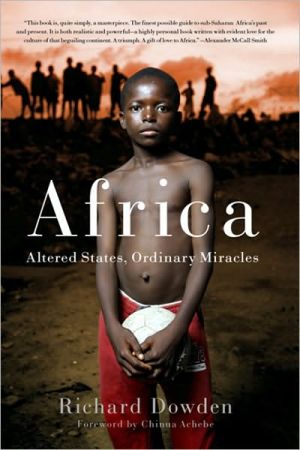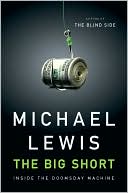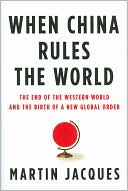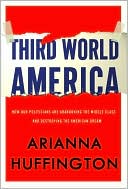Africa: Altered States, Ordinary Miracles
After a lifetime’s close observation of the continent, one of the world’s finest Africa correspondents has penned a landmark book on life and death in modern Africa. It takes a guide as observant, experienced, and patient as Richard Dowden to reveal its truths. Dowden combines a novelist’s gift for atmosphere with the scholar’s grasp of historical change as he spins tales of cults and commerce in Senegal and traditional spirituality in Sierra Leone; analyzes the impact of oil and the internet...
Search in google:
After a lifetime’s close observation of the continent, one of the world’s finest Africa correspondents has penned a landmark book on life and death in modern Africa. It takes a guide as observant, experienced, and patient as Richard Dowden to reveal its truths. Dowden combines a novelist’s gift for atmosphere with the scholar’s grasp of historical change as he spins tales of cults and commerce in Senegal and traditional spirituality in Sierra Leone; analyzes the impact of oil and the internet on Nigeria and aid on Sudan; and examines what has gone so badly wrong in Zimbabwe, Rwanda, Burundi, and the Congo. Dowden’s master work is an attempt to explain why Africa is the way it is, and enables its readers to see and understand this miraculous continent as a place of inspiration and tremendous humanity. The New York Times - Nicholas Kristof Dowden is at his best when looking at grand themes—like the degree to which Africa is more promising than journalists or aid workers often acknowledge…journalists tend to cover Africa in stark and simple contrasts, but countries live and grow and falter in grays. So it's refreshing to encounter not only Dowden's hopefulness, but also his reliance on shading and nuance, on the recognition that the world does not have to feel sorry for Africa to care about it.
Map viAcknowledgements xiForeword Chinua Achebe xiii1 Africa is a night flight away: Images and realities 12 Africa is different: Uganda I 113 How it all went wrong: Uganda II 384 The end of colonialism: New states, old societies 515 Amazing, but is it Africa? Somalia 906 Forward to the past: Zimbabwe 1277 Breaking apart: Sudan 1588 A tick bigger than the dog: Angola 1999 Missing the story and the sequel: Burundi and Rwanda 22310 God, trust and trade: Senegal 25511 Dancers and the leopard men Sierra Leone 28412 The positive positive women: AIDS in Africa 32113 Copying King Leopold: Congo 35314 Not just another country: South Africa 38015 Meat and money: Eating in Kenya 41516 Look out world: Nigeria 43917 New colonists or old friends? Asia in Africa 48418 Phones, Asians and the professionals: The new Africa 509Epilogue 543Further Reading 551Index 554
\ From the PublisherTimes UK\ “This book is anecdotal, engaging, realistic, and delightfully up-to-date.”\ \ \ \ \ Nicholas KristofDowden is at his best when looking at grand themes—like the degree to which Africa is more promising than journalists or aid workers often acknowledge…journalists tend to cover Africa in stark and simple contrasts, but countries live and grow and falter in grays. So it's refreshing to encounter not only Dowden's hopefulness, but also his reliance on shading and nuance, on the recognition that the world does not have to feel sorry for Africa to care about it.\ —The New York Times\ \ \ Library JournalDowden (director, Royal African Soc.) can be forgiven if each of the 18 chapters in his massive tome feels like an abridged version of a larger book; summarizing the history, politics, and people of an entire continent in one volume is a daunting task. Dowden, however, has a wealth of personal experience to qualify him for the job, having first visited Africa as a volunteer teacher in the 1970s and then become a highly regarded Africa-based journalist. Here he attempts to educate readers about Africa's many different nations and to counter the claim that journalists have harmed Africa by publicizing only negative news about it. He alternates chapters each devoted to a particular African nation with chapters on particular issues. Dowden writes in a conversational tone, freely offering up his opinions on controversial topics including politics, foreign investment, the AIDs crisis, and Africa's leadership vacuum. Like other recent works in English on Africa, such as Martin Meredith's The Fate of Africa: A History of Fifty Years of Independence and John Reader's Africa: A Biography of the Continent, this work is essentially subjective; unfortunately, books that describe Africa more objectively at this time are primarily directed at juvenile readers. Despite Dowden's optimistic conclusion, much of what he discusses is deeply tragic and can leave the reader feeling discouraged about Africa's future. Recommended for informed readers; includes an introduction by famed African author Chinua Achebe.\ —April Younglove\ \ \ \ \ \ Kirkus ReviewsThe director of the Royal African Society offers an ambitious, roundly informative and still intimate look at sub-Saharan Africa's turbulent road in the modern era. Though Dowden fell in love with the continent when he ventured to Uganda in the early 1970s as an idealistic young teacher, he was booted out by Idi Amin's burgeoning regime. As a journalist covering African politics, he has seen firsthand how the so-called Big Man leaders-specifically Mobutu in Congo, Daniel arap Moi in Kenya, Sani Abacha in Nigeria and Robert Mugabe in Zimbabwe-have systematically destroyed many of the fledging nations by establishing a ruthless military rule, squandering rich natural resources and nationalizing industry, thereby holding the reins of wealth. The end of colonialism has given way to horrendous civil wars, genocide and the increased impoverishment of the African people, largely because the government systems left by the imperial powers were not rooted in African culture or experience but were based on Western models. Moreover, Dowden notes, many Western powers, including Britain, France and the United States, supported dictatorships that served their own strategic interests, such as the Israeli training and backing of Amin. The author methodically examines some of the toughest issues facing many African nations in their struggle for self-determination and autonomy: the 1994 genocide in Rwanda; rampant government corruption; the curse of diamonds and oil; and the devastation of the AIDS epidemic. He also looks at the phenomenal success story of Asian emigrants and businesses moving to the continent; the Chinese, in particular, "go where Western workers fear to tread." Dowden displays a deeplyfelt knowledge of the recent history of sub-Sahara Africa, and his suggestions for its future are well-informed and wise. A remarkably full-bodied and frank discussion of Africa's place in the world. Agent: Gordon Wise/Curtis Brown UK\ \








